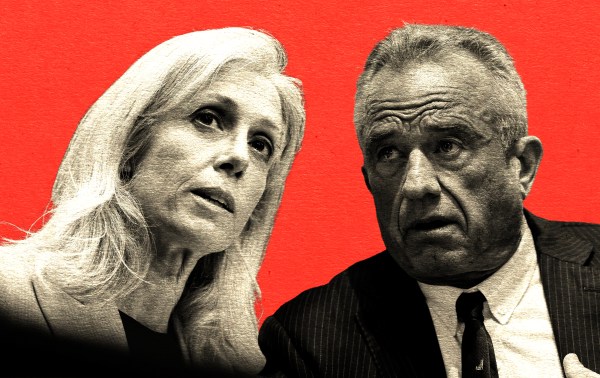Amid all of the well-placed urgency and occasionally misplaced panic of the COVID-19 pandemic, many have decided there’s a pressing need to debate whether terms such as “Wuhan virus” or “Chinese coronavirus” are racist.
On one side is a broad coalition that includes liberal pundits, Democratic politicians, the World Health Organization and the Chinese government.
“Calling it the ‘Chinese coronavirus’ isn’t just racist,” Sen. Kamala Harris tweeted, “it’s dangerous and incites discrimination against Asian Americans and Asian immigrants.”
Rep. Judy Chu (D-California), chair of the Congressional Asian Pacific American Caucus, says, “Calling the 2019 novel coronavirus the ‘Chinese’ or ‘Wuhan’ coronavirus is as descriptive as calling it the ‘CPAC coronavirus’—that is to say not descriptive at all.”
MSNBC host Chris Hayes opined that it’s “just astoundingly gross to call it the Wuhan virus.”
The Chinese government agrees.
“Despite the fact that the WHO has officially named this novel type of coronavirus, certain American politicians, disrespecting science and the WHO decision, jumped at the first chance to stigmatize China and Wuhan with it,” Chinese foreign ministry spokesman Geng Shuang said. “We condemn this despicable practice.”
I think on the merits all of these people are mostly wrong. Many illnesses have been named after the place where they originated or were first identified. As my American Enterprise Institute colleague Lyman Stone points out, the Hong Kong flu, Asian flu, Russian flu, Berlin flu, Marburg virus and Zika virus (just to name a few) all derive their names from where they were first isolated. (Zika was named for a forest in Uganda.) Even Lyme disease derives its name from Old Lyme, Connecticut.
Moreover, as T. Becket Adams of the Washington Examiner has chronicled, many of the media outlets condemning the practice of referring to it as the “Chinese coronavirus” or the “Wuhan virus” used the same terminology until fairly recently, when the WHO coined the official name “COVID-19.” The New York Times posted a link to a Jan. 21 article, tweeting: “The first U.S. case of the Wuhan coronavirus has been confirmed in Washington State.” Even the Chinese government called it the “Wuhan virus” at first.
This also leaves out the fact that China deserves to be blamed for this turning into a pandemic. It initially tried to cover up the outbreak, refusing to cooperate with international health agencies and going so far as to arrest doctors who tried to notify the public of the dangers. Why people should be so eager to carry water for China’s PR cleanup operation is beyond me.
So on one level the woke warriors are just wrong. But there’s another dynamic at work as well.
While it’s not racist to refer to it as the Chinese coronavirus or Wuhan virus, there are people on the right eager to play into the very stereotype the left is decrying by refusing to use the official name. This brouhaha started in large part because of a “Wuhan virus” tweet by Rep. Paul Gosar (R-Arizona), a crackpot fond of playing footsie with white supremacist idiots. (He’s claimed, among other things, that the 2017 “Unite the Right” rally in Charlottesville, Virginia, was a left-wing stunt possibly funded by George Soros.)
Gosar is a special case, but plenty of more mainstream people enjoy using an unofficial label simply to troll the politically correct and elicit cries of “racism!”
Others have a more serious agenda. Some people, deeply committed to the new nationalist cause and the effort to paint China as an enemy of the United States, have jumped on this crisis as an opportunity to further stigmatize China. After all, a crisis is a terrible thing to waste. That’s why President Trump tweeted on Tuesday, “We need the Wall more than ever!”
In his address to the country Wednesday night, Trump said, “This is the most aggressive and comprehensive effort to confront a foreign virus in modern history.” The response played out along the same lines as the virus-name controversy, with opponents decrying xenophobic bigotry and defenders noting that the statement is literally true.
The defenders are right, but the same problem applies. Why call it a “foreign virus”? Have we gone to greater lengths to defeat “domestic” viruses? Would we act differently if this wasn’t some invasive plague?
The need to troll China or piggyback an anti-China agenda (whatever its merits) as well as the need to decry the “real problem” of racism both strike me as desperate efforts to exploit a crisis or find comfort in more familiar arguments.
And it’s a spectacular waste of time and energy.
Photograph by John Moore/Getty Images.







Please note that we at The Dispatch hold ourselves, our work, and our commenters to a higher standard than other places on the internet. We welcome comments that foster genuine debate or discussion—including comments critical of us or our work—but responses that include ad hominem attacks on fellow Dispatch members or are intended to stoke fear and anger may be moderated.
With your membership, you only have the ability to comment on The Morning Dispatch articles. Consider upgrading to join the conversation everywhere.